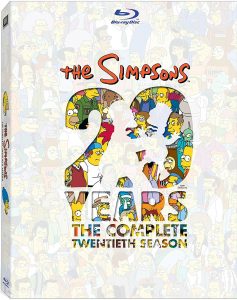Last week, “The Simpsons” was the clear winner in the laugh tally against “The Cleveland Show” and “Family Guy.” I can’t say that every week, but I can say it often enough to make a case that “The Simpsons” still has plenty of laughs left in the tank.
Sunday night on Fox, after the 450th episode (7 p.m. Central), Morgan Spurlock will present his documentary chronicling “The Simpsons’ ” 20 years on TV. Among the fans he will interview, according to an Entertainment Weekly blurb, are those who believe “Simpsons” should’ve gone off the air 10 years ago (I am not one to question other people’s fanhood, but if you root for your show to be canceled, that’s doesn’t make you much of a fan).
By all accounts, “Simpsons” isn’t as good as it used to be. It was on everyone’s “best of the ’90s” lists; I didn’t see it on a single “best of the ’00s” list, even The Onion AV Club’s, which went 30 deep. It didn’t make my top 20, either, although I may have snubbed it in favor of sexier picks. In the ’00s, “Simpsons” made an important evolution. It actually became two shows in one — half of the episodes are now about social issues, with Homer as the put-upon everyman; the other half is the old family relationship stuff, where Homer is the buffoon. (It’s illogical that he should fit two seemingly opposite roles, yet it works well enough that Seth MacFarlane copied the formula for Peter, Cleveland and Stan.)
I watched Sunday’s animation block with my dad, who likes “The Simpsons” and who isn’t exactly the target audience for the coarser MacFarlane shows. We shared laughs during “The Simpsons,” like when Grampa matter-of-factly says he’ll become “the most famous Abraham ever to have lived.” “Cleveland” provides a nice bit of bathroom humor (when Cleveland enters a sans-toilet-paper stall) and “Family Guy” earns a snort when amnesiac Peter says “D’oh!” and Lois tells him that’s not his catchphrase.
Still, the MacFarlane shows mostly have me cringing in fear of the next sexually explicit or crude gross-out gag. With “The Simpsons,” there are no such worries. It’s a tamer show. It’s a warmer show. About half the time it’s a funnier show.
Sunday’s was a Homer-and-Grampa episode, but of course, there have been bonding stories featuring every combination of Springfieldians. And it’s the realness of those relationships — even though everything else on the show is absurd, including the fact that no one has aged since Jan. 14, 1990 — that gives “Simpsons” a stronger foundation than MacFarlane’s shows.
That’s why I’d feel a sense of loss if “Simpsons” ended, and only a sense of disappointment if “Family Guy” ended (again). Luckily, Matt Groening recently said “Simpsons” can go another 20 years as far as he’s concerned.
Now here’s an interesting question, which was posed by the Associated Press’ Frazier Moore in his recent “Simpsons” write-up. How much has “The Simpsons” changed society in the last 20 years? Harry Shearer, who voices several characters, argued that it hasn’t: “For instance, I don’t really think ‘The Simpsons’ has increased the country’s skepticism about nuclear power,” he told Moore.

“The Simpsons” is a soapbox with a lot of listeners. But, as listeners, we are more like a congregation going to the same church every week. I agree with just about every political point “The Simpsons” makes (and on the rare times I don’t, the jabs are soft enough that I laugh anyway), but all that gets out of me is a bittersweet chuckle, not a spark of motivation.
For example, I remember an episode where Marge visits a museum exhibit that extrapolates Springfield three years in the future. It shows everybody under water (presumably after the ice sheets broke off). “Well, that’s not for another three years,” Marge (representing society at large) says dismissively. I laughed. But did I start riding a bike to work instead of driving? No. (In my defense, I do recycle and turn lights and faucets off when I’m out of the room.) I suspect I’m representative of the typical viewer in that sense.
“Simpsons” has changed TV, though — absolutely for the better. Entertainment Weekly mentioned “Family Guy,” “South Park” and “30 Rock” as being influenced. I think we can expand that to every adult animated show, every non-laugh-track sitcom and every pop-culture-conscious show that has come out since 1990. Groening’s other show, “Futurama,” one of my all-time favorites — which is returning with new episodes this year — wouldn’t exist without “The Simpsons.”
“The Simpsons” should only end if there is nothing left to make fun of in the world. That won’t happen, so instead it should end only when Dan Castellaneta’s voice gives out, and not a moment sooner.
Has “The Simpsons” changed the world, or just TV? Make your arguments in the comment thread.

